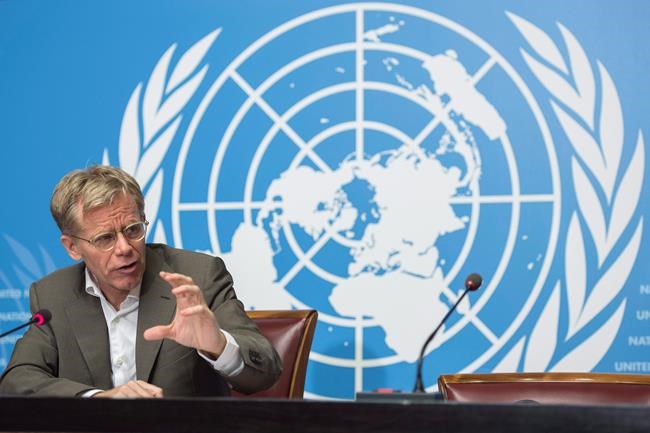Renowned Canadian epidemiologist to lead coronavirus study team: WHO
Advertisement
Read this article for free:
or
Already have an account? Log in here »
To continue reading, please subscribe:
Monthly Digital Subscription
$0 for the first 4 weeks*
- Enjoy unlimited reading on winnipegfreepress.com
- Read the E-Edition, our digital replica newspaper
- Access News Break, our award-winning app
- Play interactive puzzles
*No charge for 4 weeks then price increases to the regular rate of $19.00 plus GST every four weeks. Offer available to new and qualified returning subscribers only. Cancel any time.
Monthly Digital Subscription
$4.75/week*
- Enjoy unlimited reading on winnipegfreepress.com
- Read the E-Edition, our digital replica newspaper
- Access News Break, our award-winning app
- Play interactive puzzles
*Billed as $19 plus GST every four weeks. Cancel any time.
To continue reading, please subscribe:
Add Free Press access to your Brandon Sun subscription for only an additional
$1 for the first 4 weeks*
*Your next subscription payment will increase by $1.00 and you will be charged $16.99 plus GST for four weeks. After four weeks, your payment will increase to $23.99 plus GST every four weeks.
Read unlimited articles for free today:
or
Already have an account? Log in here »
Hey there, time traveller!
This article was published 10/02/2020 (2129 days ago), so information in it may no longer be current.
OTTAWA – Renowned Canadian epidemiologist Bruce Aylward will be leading a team of World Health Organization experts in China to study the outbreak of the novel coronavirus.
Aylward arrived in China today to lay the groundwork for the larger international team tasked with learning more about the virus and China’s public health response to it.
Dr. Michael Ryan, executive director of WHO’s health emergencies program, says the team’s mission will be to learn what investigations into the virus have already been carried out in China and to understand what has been one of the largest public health responses in history.

But first, Ryan says Aylward and his team will be looking to the origin of the virus and the severity of the disease.
Aylward is a veteran of past infectious disease outbreaks, having directed WHO’s 2,000-person response to the West Africa Ebola outbreak.
He joined WHO in 1992, and worked in the Middle East, Western Pacific, Europe, North Africa and Central and Southeast Asia in the field of immunization and communicable disease control; he has been responsible for a major overhaul of the way WHO responds to health emergencies.
In China, Aylward and his team of about 10 experts will collaborate with Chinese scientists and public health officials to decide which parts of the country to visit, and which unanswered questions to tackle first.
“We want to learn more about the virus, to learn more about the investigations that have been carried out by Chinese scientists and epidemiologists, to understand the nature of the public health response — which reaches right from the lowest level of the community right the way through the system to the top,” Ryan said.
As of Monday morning, there were 40,554 confirmed cases of the coronavirus, the vast majority of which are in China, and 910 deaths.
This report by The Canadian Press was first published Feb. 10, 2020.




